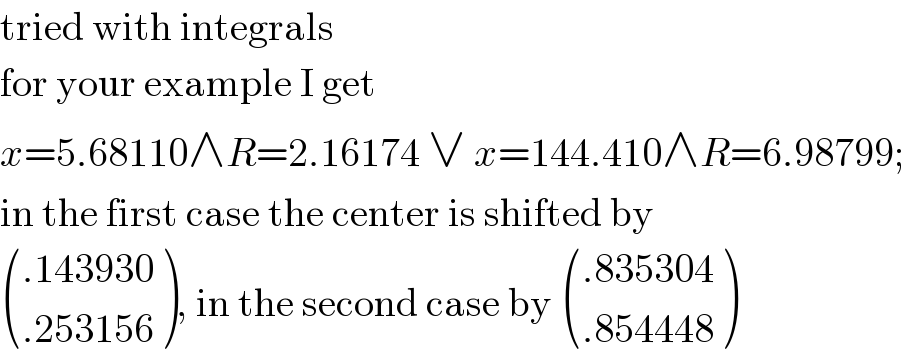Question Number 48338 by ajfour last updated on 22/Nov/18

Commented by mr W last updated on 23/Nov/18

$${nice}\:{working}! \\ $$
Commented by ajfour last updated on 22/Nov/18

$${For}\:{example}\:\:\:{p}=\mathrm{2}\:,\:{q}=\mathrm{4},\:{r}=\mathrm{3}. \\ $$$${Find}\:\:{x}=\:?. \\ $$
Commented by ajfour last updated on 22/Nov/18

$${Will}\:{this}\:{do}\:{Sir}\:? \\ $$
Commented by ajfour last updated on 22/Nov/18

Commented by ajfour last updated on 22/Nov/18

$${R}^{\mathrm{2}} \mathrm{cos}^{−\mathrm{1}} \frac{{h}}{{R}}−{h}\sqrt{{R}^{\mathrm{2}} −{h}^{\mathrm{2}} }\:=\:{p}+{q} \\ $$$${R}^{\mathrm{2}} \mathrm{cos}^{−\mathrm{1}} \frac{{h}}{{R}}−{k}\sqrt{{R}^{\mathrm{2}} −{k}^{\mathrm{2}} }\:=\:{r}+{p} \\ $$$$\:\:\:{x}\:=\:\pi{R}^{\mathrm{2}} −{p}−{q}−{r} \\ $$$${And}\:\:\:\:\:\frac{\pi{R}^{\mathrm{2}} }{\mathrm{4}}\:=\:\frac{{q}+{r}}{\mathrm{2}}+{hk} \\ $$$$\:\:\:\Rightarrow\:\frac{\pi{R}^{\mathrm{2}} }{\mathrm{4}}\:=\frac{{q}+{r}}{\mathrm{2}}+{h}'{k}'{R}^{\mathrm{2}} \\ $$$$\:\:\:\:\:{R}^{\:\mathrm{2}} \:=\:\frac{\left({q}+{r}\right)/\mathrm{2}}{\frac{\pi}{\mathrm{4}}−{h}'{k}'} \\ $$$$\_\_\_\_\_\_\_\_\_\_\_\_\_\_\_\_\_\_\_\_\_\_\_\_ \\ $$$$\:{let}\:\frac{{h}}{{R}}\:=\:{h}'\:\:\:\&\:\frac{{p}}{{R}^{\mathrm{2}} }\:=\:{p}'\:{and}\:{so}\:{on} \\ $$$$\mathrm{cos}^{−\mathrm{1}} {h}'−{h}'\sqrt{\mathrm{1}−{h}'^{\:\mathrm{2}} }\:=\:\left(\frac{{p}+{q}}{{q}+{r}}\right)\left(\frac{\pi}{\mathrm{2}}−\mathrm{2}{h}'{k}'\right) \\ $$$$\mathrm{cos}^{−\mathrm{1}} {k}'−{k}'\sqrt{\mathrm{1}−{k}'^{\:\mathrm{2}} }\:=\:\left(\frac{{r}+{p}}{{q}+{r}}\right)\left(\frac{\pi}{\mathrm{2}}−\mathrm{2}{h}'{k}'\right) \\ $$$$\:\boldsymbol{{x}}\:=\:\frac{\boldsymbol{\pi}\left(\boldsymbol{{q}}+\boldsymbol{{r}}\right)}{\left(\frac{\boldsymbol{\pi}}{\mathrm{2}}−\mathrm{2}\boldsymbol{{h}}'\boldsymbol{{k}}'\right)}−\left(\boldsymbol{{p}}+\boldsymbol{{q}}+\boldsymbol{{r}}\right)\:. \\ $$
Commented by MJS last updated on 22/Nov/18

$$\mathrm{tried}\:\mathrm{with}\:\mathrm{integrals} \\ $$$$\mathrm{for}\:\mathrm{your}\:\mathrm{example}\:\mathrm{I}\:\mathrm{get} \\ $$$${x}=\mathrm{5}.\mathrm{68110}\wedge{R}=\mathrm{2}.\mathrm{16174}\:\vee\:{x}=\mathrm{144}.\mathrm{410}\wedge{R}=\mathrm{6}.\mathrm{98799}; \\ $$$$\mathrm{in}\:\mathrm{the}\:\mathrm{first}\:\mathrm{case}\:\mathrm{the}\:\mathrm{center}\:\mathrm{is}\:\mathrm{shifted}\:\mathrm{by} \\ $$$$\begin{pmatrix}{.\mathrm{143930}}\\{.\mathrm{253156}}\end{pmatrix},\:\mathrm{in}\:\mathrm{the}\:\mathrm{second}\:\mathrm{case}\:\mathrm{by}\:\begin{pmatrix}{.\mathrm{835304}}\\{.\mathrm{854448}}\end{pmatrix} \\ $$
